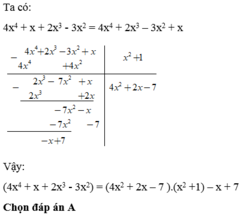số dư trong phép chia ( 6x3- 3x2+ 5x +4) : (x2-1)
Hãy nhập câu hỏi của bạn vào đây, nếu là tài khoản VIP, bạn sẽ được ưu tiên trả lời.


Bài 1:
a: \(=\dfrac{2x^4-8x^3+2x^2+2x^3-8x^2+2x+18x^2-72x+18+56x-15}{x^2-4x+1}\)
\(=2x^2+2x+18+\dfrac{56x-15}{x^2-4x+1}\)

Lời giải:
a.
PT $\Leftrightarrow 3x^2+\frac{x}{2}-3x^2+3x+2=0$
$\Leftrightarrow \frac{7}{2}x+2=0$
$\Leftrightarrow \frac{7}{2}x=-2$
$\Leftrightarrow x=-2: \frac{7}{2}=\frac{-4}{7}$
b.
PT $\Leftrightarrow 5x^2-3-5x^2-6x=0$
$\Leftrightarrow -3-6x=0$
$\Leftrightarrow 6x=-3$
$\Leftrightarrow x=\frac{-3}{6}=\frac{-1}{2}$

`a,`
`5x(x^2-2x+1)`
`= 5x*x^2+5x*(-2x)+5x*1`
`= 5x^3-10x^2+5x`
`b,`
`(3x^2+x) \div (-3x)`
`= 3x^2 \div (-3x) + x \div (-3x)`
`= (3 \div 3)*(x^2 \div x)+ (1 \div -3)*(x \div x)`
`= x+ (-1/3)`

a) Đa thức thương x 2 – 6x + 9.
b) Đa thức thương 2 x 2 – 5.
c) Đa thức thương x 2 + 4x + 3 và đa thức dư -12.
d) Đa thức x + 5 và đa thức dư x – 4.

Ta có: \(\left(15x-6x+7\right):\left(2x+1\right)=5\)
Áp dụng định lý Bozout, ta có:
\(f\left(\frac{-1}{2}\right)=15\cdot\frac{-1}{2}-6\cdot\frac{-1}{2}+7=\frac{5}{2}\)
Vậy số dư là 2,5

